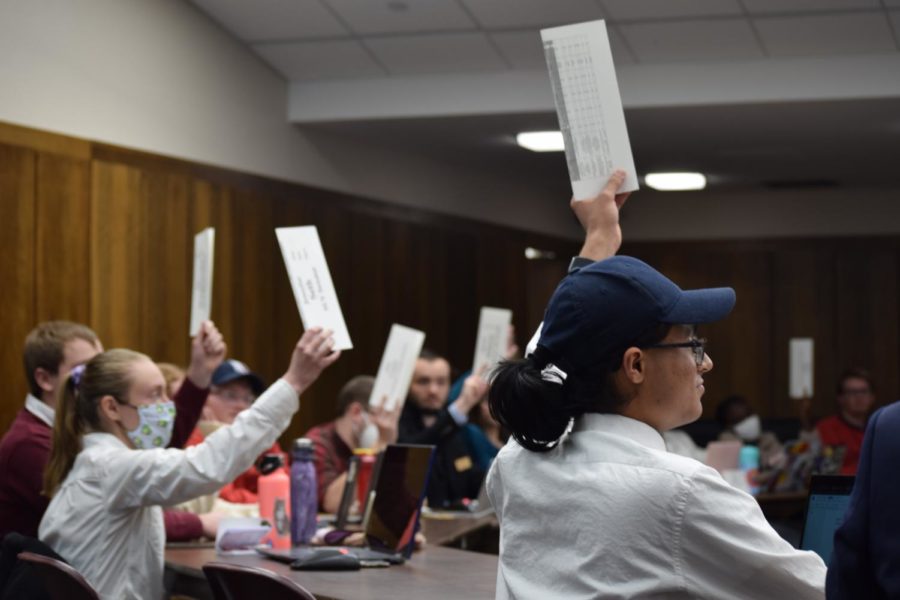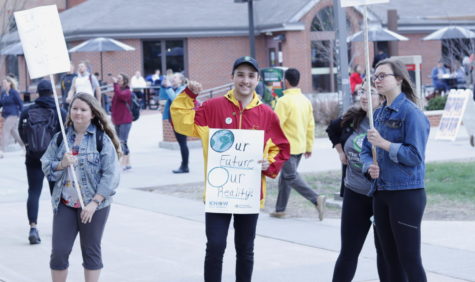ISU students engagement and understanding with StuGov
February 6, 2022
A poll conducted by the Iowa State political science department found that 75 percent of Iowa State students didn’t know Student Government’s funding comes from student fees, and 39.2 percent of students in a student club consider the yearly $44 student fee worthwhile.
For those not participating in a campus club, this number drops to 12.3 percent of students find their fees are worthwhile, and only 18.4 percent of students said they are a member of a club funded by the Student Government.
Finance Director Mason Zastrow, a senior in political science, philosophy and sociology, said he thinks this statistic is overstated because students don’t realize Student Government funds their organization. Clubs receive funding from Student Government and can apply for it through the Annual Allocations process.
Zastrow said he sees Student Government as a service organization for students.
“I think it is a group of students who want to see their student activity fees properly dispersed,” Zastrow said. “People who want improvements to their campus to be heard, who want to be the voice of students when talking to administration.”
Zastrow said regardless of how much students know funding for campus organizations comes from student fees, Student Government still funds 130 organizations and clubs, including lectures, the Students Helping Our Peers (SHOP) food pantry and the Student Union Board.
Over 75 percent of students stated they did not feel they adequately benefited from the fee. Every college receives a number of senators based on the number of students in each college. Zastrow said this structure ensures all students have an equal representation within Student Government.
Based on the Daily’s survey, only 24.7 percent of survey respondents voted in the Student Government election, while 87.1 percent didn’t know who currently represents them.
For students who don’t benefit from Student Governments funding student organizations, Zastrow encourages them to become involved with Student Government.
For students involved in a student organization or club, 39.2 percent of them said they find the fee worthwhile. Over 80 percent of survey respondents said they never or rarely think about Student Government and its functions.
“I think a lot of people don’t realize what the fee does,” Zastrow said. “Especially for people who are in organizations, I am kind of surprised to hear that because effectively what we do is subsidize organizations so people are able to experience more opportunities at a lower cost.”
Student Government has parameters for clubs applying for funds; clubs come to the body with varying initiatives based on their needs for the funding.
While funding student organizations may be Student Government’s greatest task, 47.4 percent of students said they think the role of Student Government is creating legislation to change how student life works and presumably make it better. In contrast, 28.1 percent of students said Student Government’s job is providing a structure for student groups and committees to be represented in Iowa State’s administration, while 24.5 percent said funding student organizations.
While elected members of Student Government can advocate for student opinion to Iowa State University Administration and the Board of Regents, it is not within Student Government’s capacity to legislate.
“What I don’t think a lot of students realize is that it is not even at the university level,” Zastrow said. “So much of it is, as soon as there is a topic that is broad enough that a lot of students care about, the Board of Regents picks it up and it is out of the hands of the university even. Although I definitely understand where that intuition is coming from, we can’t legislate anything. We can just kind of give student opinion to the people doing the legislating.”
Election Commissioner Ross Opie, a senior majoring in finance and criminal justice, said Student Government’s overall role is to represent the student body’s concerns on campus and address those by passing legislation in the senate.
Within that function, the Election Commission runs, plans and facilitates the election process every school year. This includes planning campaign informational sessions, organizing candidates and running the debates.
During the 2021 Student Government elections, many outreach events had to be virtual due to COVID-19. This year, Opie said the Election Commission is working especially hard to increase outreach partly due to the work of Public Relations Chair Cody Neeper-Burris, is a senior majoring in political science.
“Basically we have been reaching out to all the constituencies and student organizations and planning a time where we can come to their meeting and go over a presentation with their members on how to run for Student Government and why it is important,” Opie said.
To increase student engagement with the body as a whole, Outreach Director Christian Grensteiner has spent the last year creating new initiatives to promote the functions and work of the Student Government.
“Our main mission is to empower students, provide them with resources and help set them up for success for their student life during their short time at this university,” Grensteiner, a sophomore majoring in event management, said.
Grensteiner wasn’t surprised by the majority of students not knowing where student fees go because he has seen a similar response anecdotally throughout his outreach work.
“I wish more people would know and that is why we have been starting to transition to outreach,” Greinsteiner said. “So we are starting to put more effort into having that being well-known with tabling events and more.”
At the start of the year, the Outreach Committee hosted an Outreach week to help inform students about the body. Now that it is election season, the Outreach Committee has joined forces with the Election Commission to promote running for office.
Based on recent multicultural town halls hosted by Student Government, Greinsteiner said they have learned that students want to run but don’t know about the process of running a campaign. Outreach Committee members are also visiting varying clubs to present about the responsibilities of running for office.
“We believe having a senate position is so important because you are voting on such important bills regarding funding, clubs or bylaws within Student Government,” Greinsteiner said. “We really think that is important so we are trying to be as diverse as we can and try and get people from different backgrounds so we can have a diverse senate.”
Upcoming events for Student Government
-
Feb. 8 at 7 p.m., the vice-presidential debates at the Great Hall
-
Feb. 15 pizza with the presidential and senate candidate events
-
Following the event will be the multicultural town hall (time and location TBD)
-
Feb. 23 at 7 p.m., the presidential debates at the Great Hall
-
Feb. 24 hot chocolate with the presidential and senate candidates (time and location TBD)
-
Elections take place March 1 and 2; ballots will be sent to students’ Iowa State emails.

















